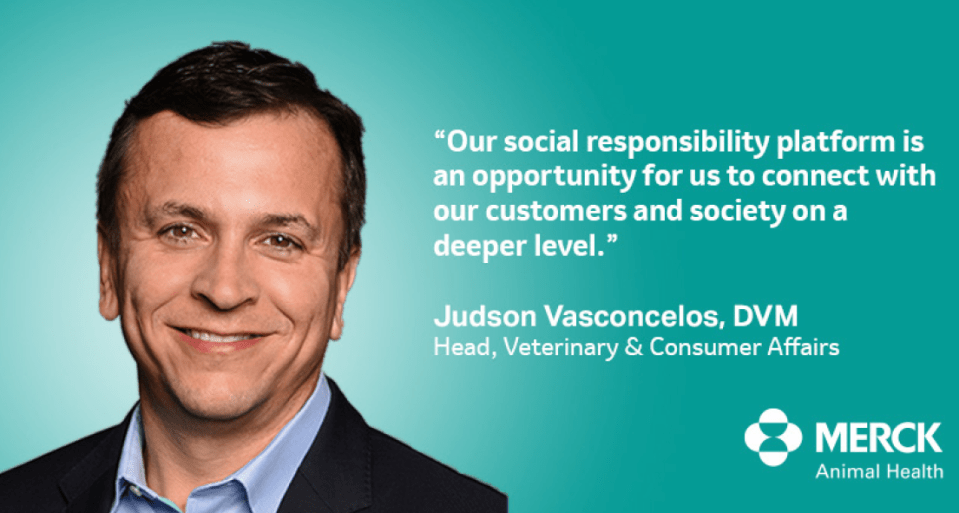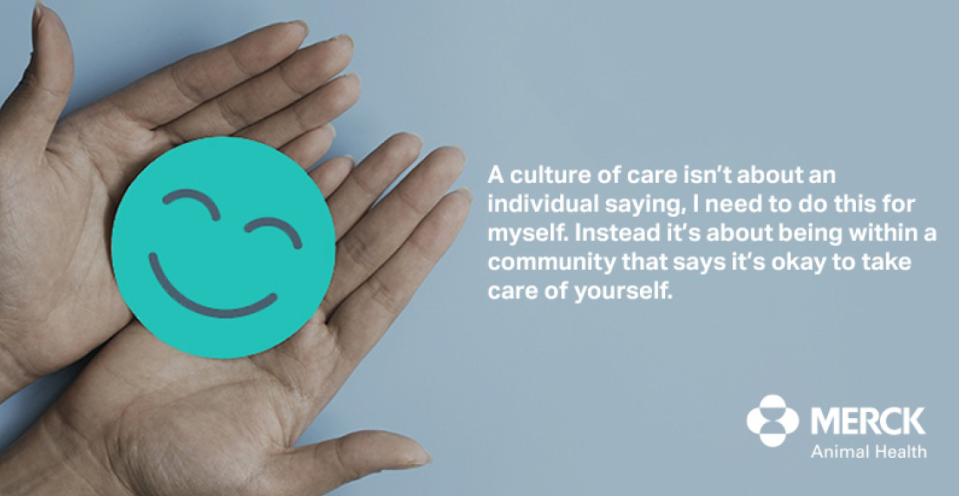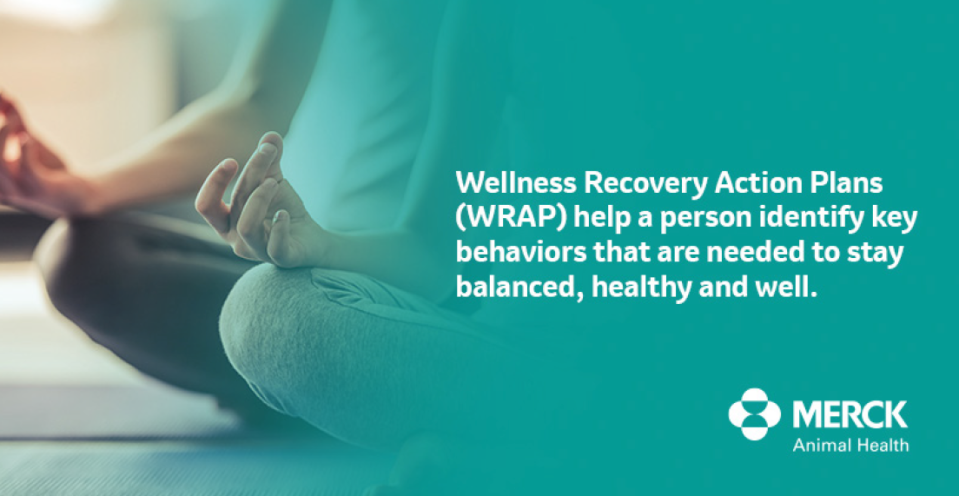Building a Culture of Care to Support Wellbeing
August is National Wellness Month
Dr. Judson Vasconcelos, DVM, PhD, Head of Merck Animal Health Veterinary Consumers Affairs Team

We live in a fast-paced world that didn’t really slow down for the global pandemic. Whether we look BC (Before Covid) or to our current state, many of us are balancing hectic schedules – work, family, community, travel (again) and let’s not forget our pets. The list sometimes seems endless. I work for a global company with a team spread across the U.S. I’m a father, a son, a friend, and at times life becomes hectic and I, like each of us, need support.
August is National Wellness Month, and I recently sat down with my friend and colleague Dr. Elizabeth Strand, Director of Veterinary Social Work at the University of Tennessee College of Veterinary Medicine, to talk about how we can build a culture of care within our communities that supports each of us taking care of our mental health and wellbeing. Supporting the veterinary profession in this arena is a priority for Merck Animal Health, and we conducted the first Merck Animal Health Veterinary Wellbeing Study in 2017, the second in 2019, and are currently conducting the third in partnerships with AVMA and Brakke Consulting. Through these studies we have been able to better understand the situation of mental health and wellbeing in the veterinary profession. Dr. Strand is one of our study authors, and so it was fitting that we sat down to talk about ways of managing stress during this important month for our latest Caring for Animals and Creating Trust podcast.
As a veterinarian, my first approach to wellness considers the physical wellness of an animal. But as any medical professional will tell you, wellness is more than our physical health – it is also our mental and emotional well-being, too. (That is something we also consider in the animals we treat by the way.) Dr. Strand and I had a fascinating conversation about what it means exactly to “take care” of ourselves – our whole selves – mentally, emotionally, and physically. Over the past year and a half, I think it’s safe to say we’ve all been challenged, and she offers some great suggestions for improving our wellbeing.


It means creating a culture where it is acceptable to not only talk about well-being, but also where we look out for and support each other’s efforts to take care of ourselves. We all need to figure out what helps us decompress and feel better. And, we all should feel it’s ok to talk about what’s going on in our lives and supported to take action to improve our quality of life. It’s also important for each of us to understand we’re not alone.
For me personally, running has proven to be the best “medicine” to relieve stress and decompress. When I’m running, I set aside – even for a few minutes, the projects I’m working on or the obligations I must meet. Running is a time for myself to think about whatever I want…a project, or a relationship, or a conversation I need to have…or a time to think about nothing at all. I use my runs as a time to reset and have found I’m more focused, relaxed, and prepared to “take on my day” when I’m done. I also recently completed a Mindfulness Based Stress Reduction (MBSR) program, which I’ve found helpful. Earlier this month I read that Olympic diver, Tom Daley, knits to relax before and after he competes. Running and knitting may not be for you, but whatever you choose, it’s just important that you find something that works for you.
The other vital component of creating a culture of care is making it normal and acceptable to talk about our wellbeing and providing resources and information about how to get help for someone who might be struggling. At Merck Animal Health, we view this as a top priority and are also seeing many other companies and organizations investing more and more into resources focused on the mental wellbeing of their employees and stakeholders.
Dr. Strand and I discussed several ways to create your own wellness journey along with resources to develop a culture of care in whatever workplace you call home. In our busy, hectic lives, self-care goes beyond what many of us initially think about – sleep, diet and exercise and includes taking care of our whole selves – mind, body, and soul if you will. Expanded helpful practices that you may find helpful include:
• Developing a Wellness Recovery Action Plan, or WRAP. A set of questions and reflections help you identify key behaviors you can use to help stay balanced, healthy, and well. This is a wellness tool you design yourself, and you can download an app on your phone to create your own WRAP.
• Building your Cardiac Coherence, also known as Resonant Breathing or Cardiac Entrainment. It is a form of breathing used to help calm the body that involves breathing at a particular pace of 5.5 breaths per minute. Doing this for 20 minutes each day is thought to have a significant impact on your feelings of anxiety and stress. Resources for this exercise can be found on phone app stores and YouTube.
• Utilizing Mindfulness Based Stress Reduction (MBSR). MBSR is an adaption of several mindfulness techniques that help people reduce stress. Developed by Jon Kabat-Zinn, PhD, it uses a combination of mindfulness meditation, body awareness, yoga, and exploration of patterns of behavior, thinking, feeling and action, and this practice cultivates self-awareness around reactions to stress. You can find a phone app by John Kabat-Zinn or explore YouTube to take the course.

At Merck Animal Health, our social commitment platform Unconditional includes seven commitments and at the top of the list is Unconditional respect for the veterinary profession. We respect the crucial role veterinarians play to pets and livestock owners, and we acknowledge the need to better understand the challenges the veterinary community is encountering. Our Merck Animal Health Veterinary Wellbeing Study encompasses U.S. veterinarians across all sectors of the profession to measure wellbeing and mental illness, and it has brought critical awareness and solutions to meeting the needs of veterinarians. Comparing the first two studies, we saw an increase in the compassion toward people who have mental illness and the value of mental wellbeing in their communities. I will be interested to see if this trend continues when we learn the results of our third and latest study.
In addition to sponsoring the ongoing Merck Animal Health Veterinary Wellbeing Study, we also provide donations and scholarships to advance the profession. Unconditional is an opportunity for Merck Animal Health to connect with our customers – farmers and veterinarians – on a deeper level. It gives us the opportunity to show them we care about them and we care about society. At Merck Animal Health, we unconditionally care to make the world a better place.

I hope you will join me not only in exploring how to build a culture of care during National Wellness Month, but beyond. Let’s use this month as a time to begin or build upon our culture of care and to put a plan together to take care of ourselves.
To learn more about creating a culture of care, tune in to my conversation with Dr. Strand and our moderator, my colleague, Jane Dukes, on the Merck Animal Health Veterinary & Consumer Affairs podcast, Caring for Animals and Creating Trust. I hope you will explore a few of these resources and insights Dr. Strand and I discussed. And, I’d love to hear what you found interesting. Send me a message about how you are creating a culture of care and let me know how I can help.
